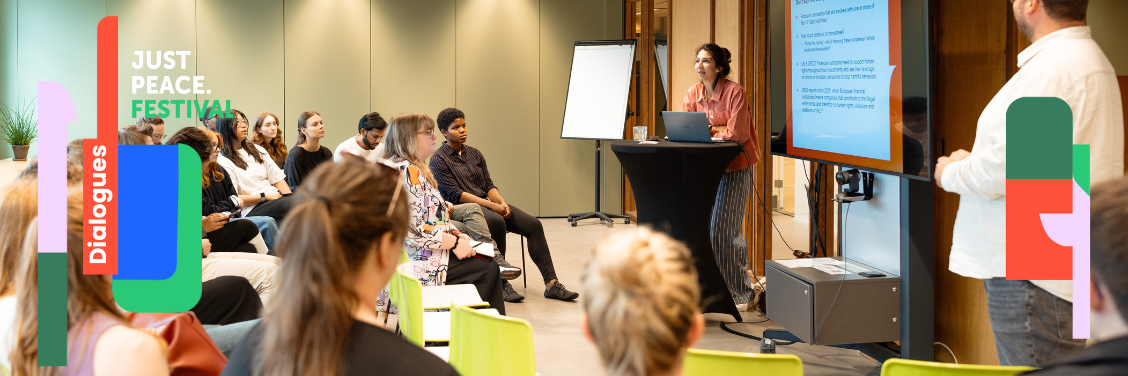Just Peace Dialogues
The Just Peace Dialogues were a set of meetings for public deliberation of key aspects of building peace in today’s world. The dialogues were held across seven days at the heart of the Just Peace Festival (16 - 22 June 2025).
The Just Peace Dialogues were open to the public, including armed forces, civil society groups, journalists, policymakers, researchers, young people, and indeed any concerned citizens. The inspiration is that respectful searching dialogue among diverse viewpoints can generate mutual understanding and new solutions.
Dialogue 1: Imagining Peace
Amidst today’s armed conflicts, authoritarian governments, cyber-attacks, organized crime, economic insecurity, and ecological destruction, it can be hard to imagine peace. What do we mean by ‘peace’, beyond the absence of war? What kind of peace are we seeking? What makes people and society at peace? What path(s) can bring us to peace? This dialogue brought together leading thinkers who pushed us to get clearer and more creative about peace.
Dialogue 2: Peace in Europe
Eighty years after 1945, Europe again faces war in its own region. How to turn this tide and have sustainable peace in Europe? To discuss this question, this dialogue looked at the experience of war in Ukraine; Russia's role in Europe; lessons of Europe’s history for future peace; the values underpinning future European peace; and Europe’s place in a changing global world. A week before the NATO Summit in The Hague, this dialogue offered a range of inspiring visions for peace in Europe. We are grateful for cooperation with PAX in organising the Peace in Europe Dialogue.
Dialogue 3: Peace in Sudan
Since April 2023 the current war in Sudan has brought larger death, destruction, and displacement than any other ongoing armed conflict on earth. This dialogue brought together wise thinkers and excellent speakers from academia, civil society, policymakers, and youth to discuss how peace can be brought back to Sudan. What kind of creative and hopeful scenarios can be envisioned for peace in Sudan? What would be the key ingredients for a lasting peace?
Dialogue 4: Peace in Israel-Palestine
Dialogue 5: Democracy and Peace
What is the relationship between democracy and peace? Do the two go hand in hand, so that less democracy means less peace? Or can democracy work against peace: for example, by producing protectionist and militarist governments? Or is there something more deeply wrong with democracy as we know it, such that future peace depends on a transformation of democracy? If so, what kind of new democracy do we need? During this Just Peace Dialogue speakers dove into these questions and many more.
Dialogue 6: Cybersecurity and Peace
Thirty years ago, pioneers of the internet expected that this new technology would be a force for freedom, democracy, justice and peace. Yet today digital communications often involve human rights abuses, criminal activity, disinformation, gender-based violence, and cyber warfare. How can we turn these tides and make online spaces serve a just peace? This Dialogue brough together experts from academia, internet governance, and quantum computing to discuss why cybersecurity is key to the discussion of peace.
Dialogue 7: Climate and Peace
Today’s world faces large-scale climate change and other environmental disruptions. Meeting these challenges involves major adjustments to economy and society, with substantial potential for conflict and violence. This dialogue assembled leading authorities on the relationship between climate and peace, including speakers from civil society, government, university and youth. The panel explored how climate change can be handled in ways that minimize war and maximize peace.

